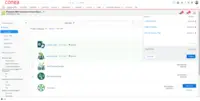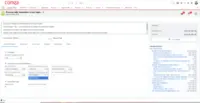Overview
What is Conga CPQ?
Conga CPQ empowers sales, partners, and customers to efficiently configure complex products and services offerings, and provide personalized prices and quotes, utilizing codified product and pricing information - to drive higher win rates and a more pleasurable buying experience. Conga…
How Conga CPQ Differs From Its Competitors
Awards
Products that are considered exceptional by their customers based on a variety of criteria win TrustRadius awards. Learn more about the types of TrustRadius awards to make the best purchase decision. More about TrustRadius Awards
Popular Features
- Configuration options (32)8.686%
- Pricing rules (31)7.777%
- Product configuration (32)7.171%
- Price adjustment (31)6.969%
Reviewer Pros & Cons
Pricing
Entry-level set up fee?
- Setup fee optional
Offerings
- Free Trial
- Free/Freemium Version
- Premium Consulting/Integration Services
Starting price (does not include set up fee)
- $35 per month per user
Features
Product Details
- About
- Integrations
- Competitors
- Tech Details
- FAQs
What is Conga CPQ?
Conga CPQ empowers sales, partners, and customers to efficiently configure complex products and services offerings, and provide personalized prices and quotes, utilizing codified product and pricing information - to drive higher win rates and a more pleasurable buying experience. Conga CPQ also helps to maintain a single price book, discounting structure, and quoting structure across all channels.
With an API-first approach, configuration, pricing, or quoting capabilities that can be embedded into any eCommerce, Direct Sales, and Partner Portal, the software helps to streamline configuration and pricing across the revenue lifecycle, and provide the flexibility to add CPQ capabilities to existing revenue operations at a pace that supports business needs.
Conga CPQ Features
CPQ Features
- Supported: Quote sharing/sending
- Supported: Credit approvals
- Supported: E-signature
- Supported: Product configuration
- Supported: Configuration options
- Supported: Pricing rules
- Supported: Price adjustment
- Supported: Purchase history and open contracts
- Supported: Guided selling/Sales portal
- Supported: Self-service CPQ
- Supported: CPQ reporting & analytics
- Supported: Proposals
- Supported: Excel integration
- Supported: CPQ-CRM integration
- Supported: Attachments to quotes
- Supported: Renewal management
- Supported: Order capturing
Additional Features
- Supported: Unlimited Attribute-based configuration
- Supported: Discounting and deal scoring
- Supported: Subscription and renewal opportunity management
- Supported: Multi-channel selling
- Supported: Quote collaboration and versioning
Conga CPQ Screenshots
Conga CPQ Video
Watch Conga CPQ overview
Conga CPQ Integrations
Conga CPQ Competitors
Conga CPQ Technical Details
| Deployment Types | Software as a Service (SaaS), Cloud, or Web-Based |
|---|---|
| Operating Systems | Unspecified |
| Mobile Application | Apple iOS, Android |
| Supported Countries | Global |
| Supported Languages | German, English, French, Dutch, Portuguese, Spanish, Chinese (Simplified) |









